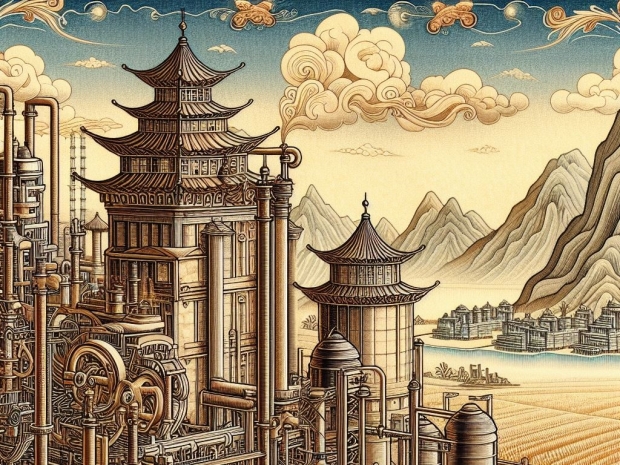The report, by University of Chicago's Chang-Tai Hsieh, National Tsinghua University's Burn Lin and Chintay Shih, said that Taiwan's lead in making advanced chips has spooked the US over what would happen if China attacked or blockaded the island.
The US CHIPS and Science Act aims to fix that by offering €47.9 billion in handouts to get chip firms to move to America. However, the report said the law will fail and could damage Taiwan's most vital industry.
The report said that chip firms are experts in different parts of the business. Taiwan Semiconductor Manufacturing Co. (TSMC) only makes high-end chips, while other key players include US firms like AMD, Nvidia and Qualcomm (which only design chips); Dutch firm ASML (which makes special machines for chip making); Japan's Tokyo Electron (which makes chip gear); and Britain's Arm Holdings (which makes software for chip design).
This expertise has two benefits. First, it means that each part of the global chain can do its best, which helps the others. Second, it means that there is more capacity in all parts of the chain, which makes the industry stronger against demand shocks.
The report says that the downside is that the industry is weak against supply shocks. This is not just a problem for Taiwan - since all parts of the chain could be bottlenecks - but Taiwan is the only one that faces a threat from China. So, the US and Japan have offered significant subsidies to TSMC to move, and TSMC now plans to build new plants in Kumamoto, Japan, and Phoenix in the US.
The plant in Japan will be finished as planned, and many of TSMC's suppliers are moving there. But the Phoenix project is already way behind, and fewer of TSMC's suppliers have plans to go there.
TSMC's experience in Camas over the past 25 years casts more doubt on the Phoenix plant. Despite hoping the Camas plant would be TSMC's foothold in the US market, the firm needed help finding the workers it needed to compete. Even after 25 years of the same training and kit, production costs are 50 per cent higher than in Taiwan. So, TSMC chose not to grow the Camas operation.
The main problem is that while US workers are good at chip design, the US needs workers who want or can do chip making. But special skills are vital in this area. Workers must be careful, pay attention to detail, and be committed to consistency, perfection, and timely production. They must know their kit well - much of which is very advanced or custom-made - and the data in the field.
TSMC Phoenix will keep struggling because too few US workers can do chip-making. Seeking economic security by moving chip-making to the US is an "expensive exercise in futility", as TSMC founder Morris Chang warned in 2022. The €47.9 billion in the CHIPS Act may seem like a lot, but it will not be enough to create a lasting chip cluster in Phoenix.
The report said that industrial policy can work only in the right conditions. TSMC is proof of that. Taiwan's industrial planners chose a niche that built on their strengths in the making. They did not try to copy Intel, the top chip firm at the time, because too few Taiwanese workers had the design skills.
Japan's subsidies to get TSMC are likely to work because Japan already has many skilled manufacturing workers.
The report warns that free money risks changing TSMC from a firm that has always focused on innovation into one that is more worried about getting subsidies. The longer TSMC tries to fix its problems in Phoenix, the less attention management will have for other things. Those problems are so big that they reportedly led to the resignation of TSMC boss Mark Liu in December.
The CHIPS Act has three significant risks. First, if TSMC loses its focus on innovation, the biggest losers will be its customers and suppliers, most of which are US firms. The broader AI revolution - much of it powered by TSMC-made chips - will stop. Also, TSMC may cut its capacity investments in Taiwan, weakening the whole industry against demand shocks.
Last, TSMC may lose its way so much that another firm replaces it as the advanced chip-making leader. Many in Taiwan already see the CHIPS Act as a US plot to steal Taiwan's technology. Taiwanese are angry at statements by US politicians who say that Taiwan is a risky place to do business or that the US needs to plan to bomb TSMC's plants and fly its bosses to the US if China invades.
TSMC's fall from its top spot would further boost the feeling that the US does not care about Taiwan. But if Taiwan's economy and security are hurt, the damage to America's national security would outweigh any gain from getting more (and pricier) chip capacity in the US. Taiwan's security is America's security.
The report concludes that while the CHIPS Act is well-meaning, it needs to be better designed. Instead of creating a lasting group of chip makers in the US, it is likely to cause long-term harm to TSMC and, in the end, to Taiwan's economy. It would be much wiser for the US to adopt a plan that .protects its economic security and strengthens Taiwan. Such a plan could be promising to defend Taiwan and build capacity in countries like Japan (where operations are less likely to hurt TSMC's business).

